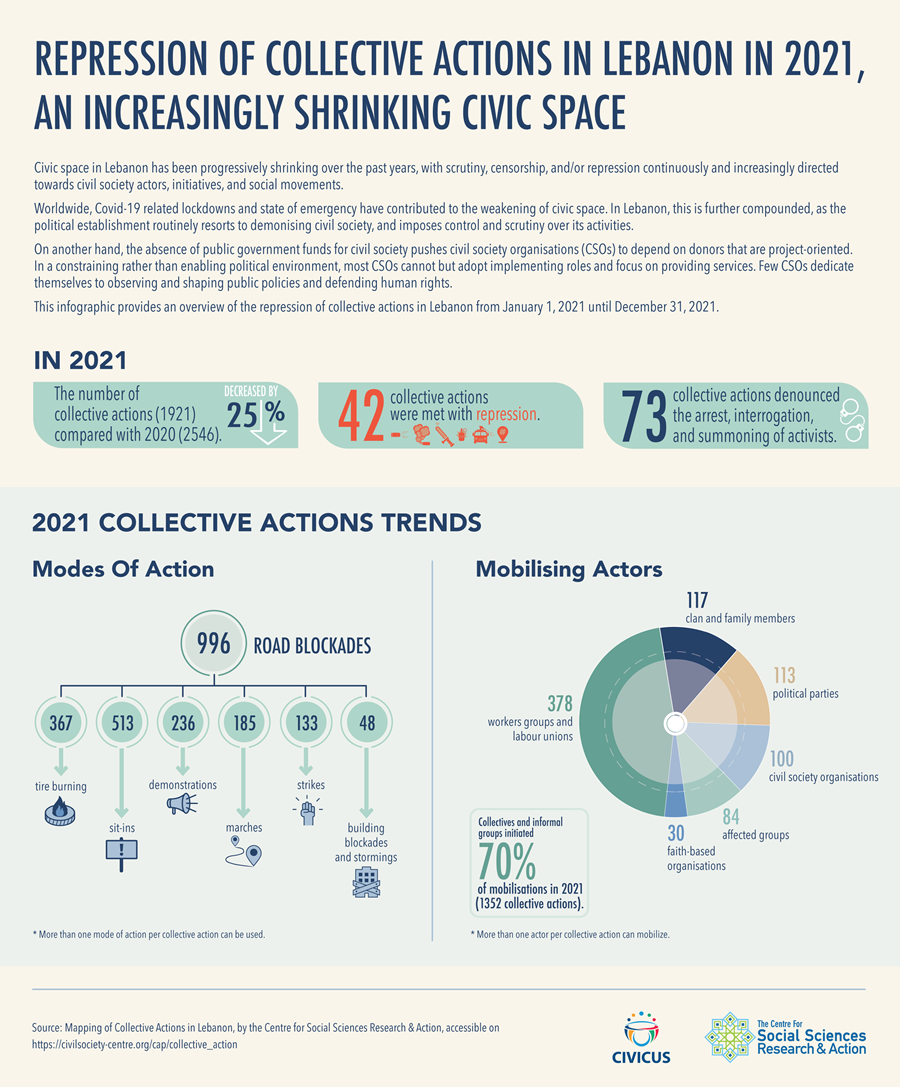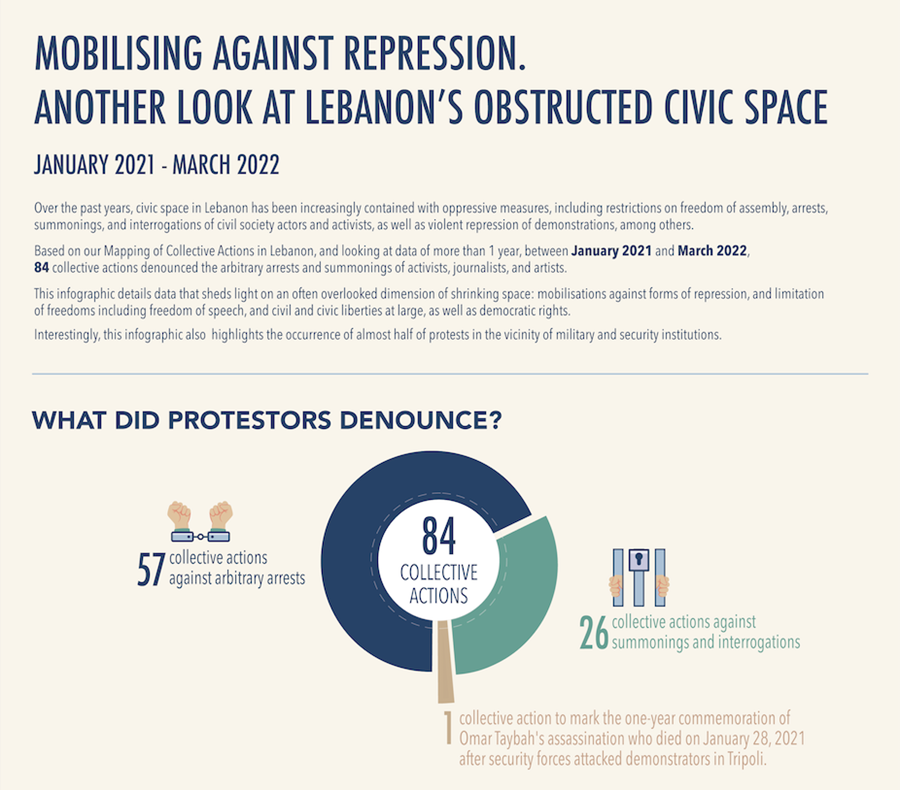[Lebanon] Civic Space Quarterly, October 2021-March 2022
[Lebanon] Civic Space Quarterly, October 2021-March 2022
A look into an increasingly shrinking space
Civic Space Quarterly. A periodical bulletin from CeSSRA’s Civil Society Observatory.
The Civic Space Quarterly provides a periodic update on the state of civil society and civic space in Lebanon. It is based on data from the CeSSRA’s Civil Society Observatory research programme and monitors the latest developments in civic space.
1. Civic Space Trends for October 2021 - March 2022
a) FREEDOM OF ASSEMBLY
Overview of Collective Actions Mapped
The period that spans from October 1, 2021 to March 31, 2022 saw 681 collective actions, with a peak in January 2022 (157). The number of mobilisations remains similar to the same period last year (from October 2020 to March 2021) when 653 collective actions were mapped.
Number of Mobilisations Modes of action
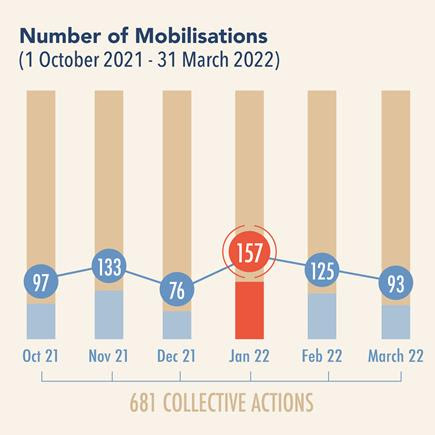
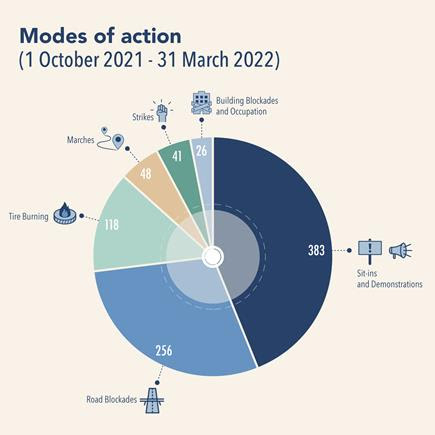
The period spanning from October 2021 till March 2022 witnessed further decreasing of purchasing power, rise in commodity prices, extended power cuts, and devaluation of the lira on the parallel currency exchange market. Faced with these deteriorating living conditions, protesters resorted to sit-ins and demonstrations (56% of all mobilisations) and roadblocks (37.5% of all mobilisations) to demand reforms (51%) and socioeconomic rights (32%). Protesters also rejected policies (19%), such as the Capital Control draft law that threatens depositors’ rights, and the Budget draft law that includes taxes and expenses that would negatively affect the lower classes.
Mobilising actors
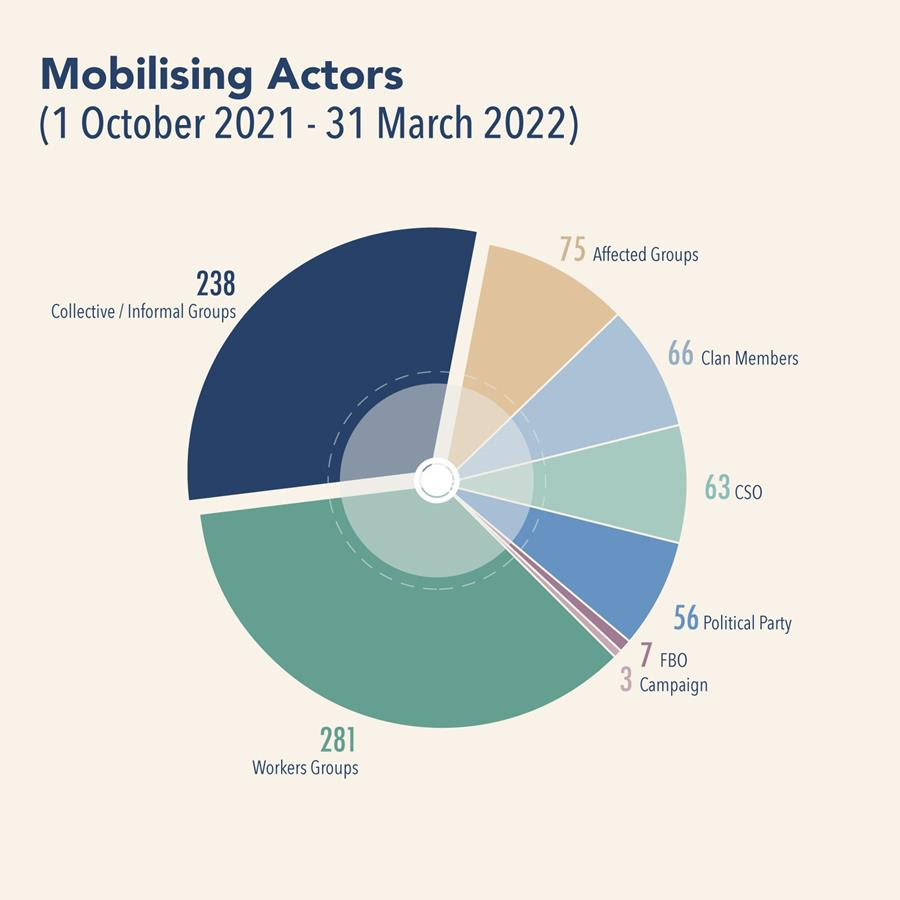
Objectives
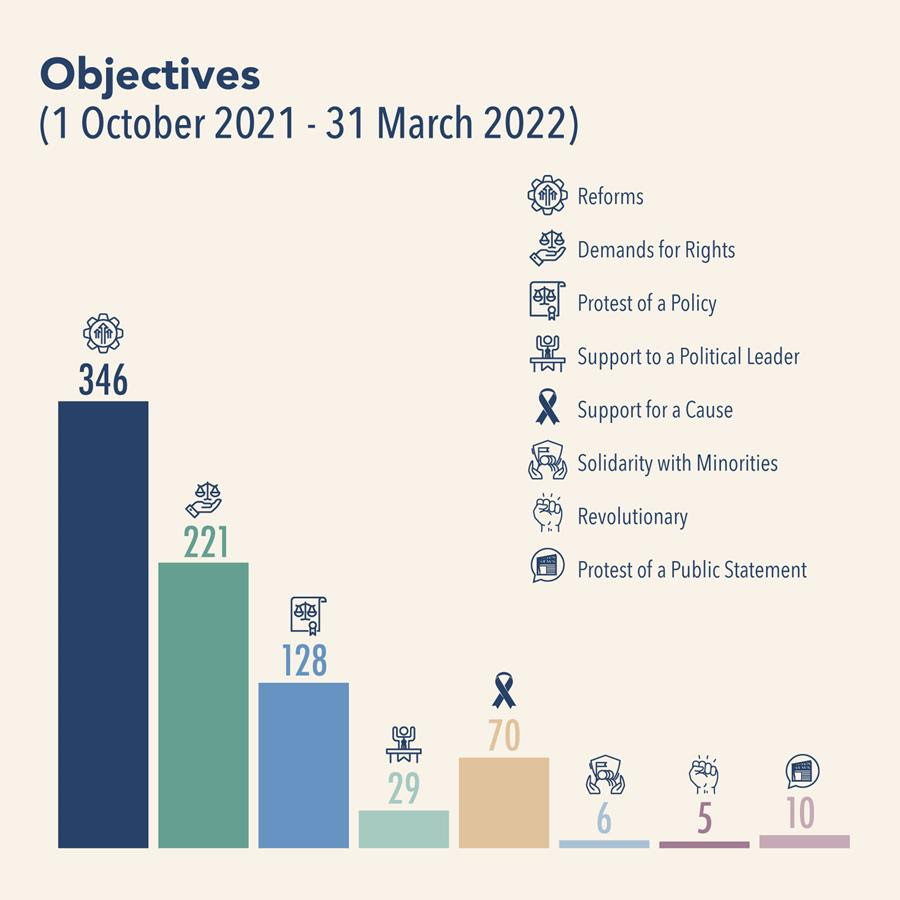
Grievances
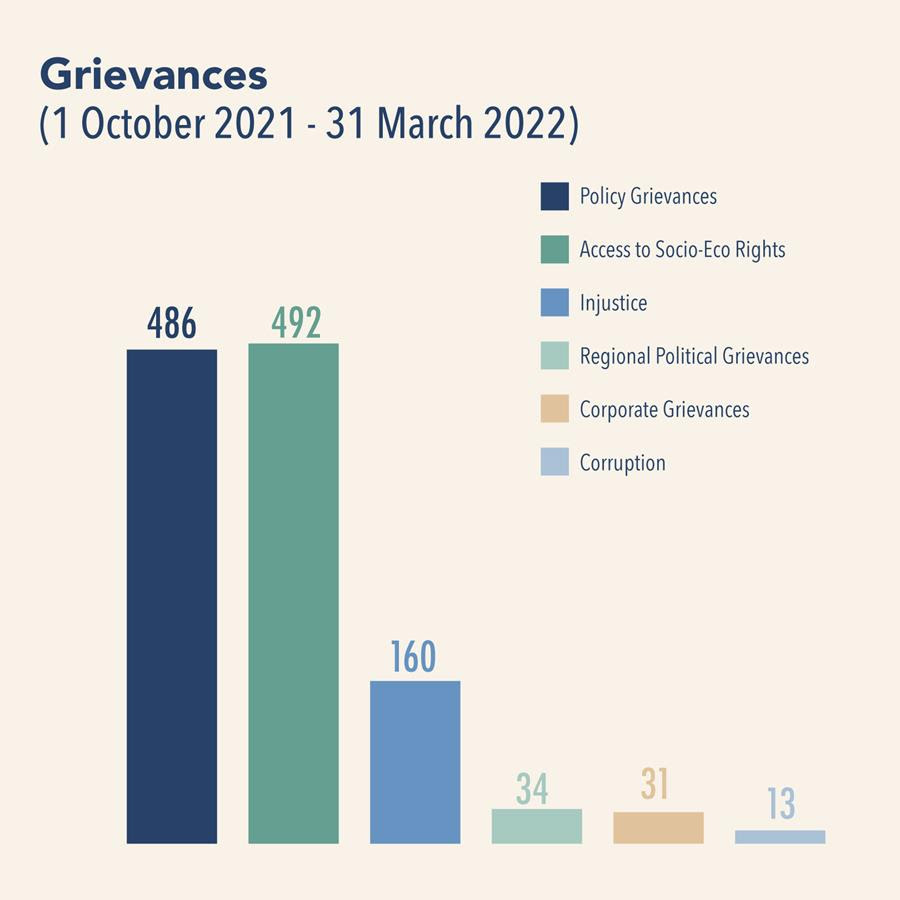
During the last quarter of 2021, collective and informal groups staged 45% (137) of all mobilisations to demand economic reforms to get access to basic necessities such as medicine, fuel, electricity and bread, and basic services such as health and education.
Over the first quarter of 2022, workers groups were the main mobilising actor with 48% (181) of all mobilisations. Healthcare workers, contract professors, land transportation drivers, military retirees, and Electricité du Liban workers are the workers groups who mobilised the most to demand better working conditions (transportation allowances, increase in wages, social assistance, health coverage, payment of school fees for their children). Most of the 41 strikes that workers staged were open-ended, lasting for several weeks, such as the strike organised by Electricite du Liban workers that lasted from March 9 until April 12, and the strike Saida hospital healthcare workers which started on September 30 and ended on October 31.
Restrictions on Freedom of Assembly
From October 1, 2021 to March 31, 2022, 20 collective actions were met with repression. Means of repression included restrictions on freedom of assembly (9), assaults on demonstrators (6), summoning and interrogations (4), arrests (1) and use of tear gas (1).
In response, and during the same period, 14 collective actions denounced the arbitrary arrest and summonings of protesters, and the repression of a sit-in. All of these took place in the vicinity of military and security institutions.
Number of mobilisations faced with repressions
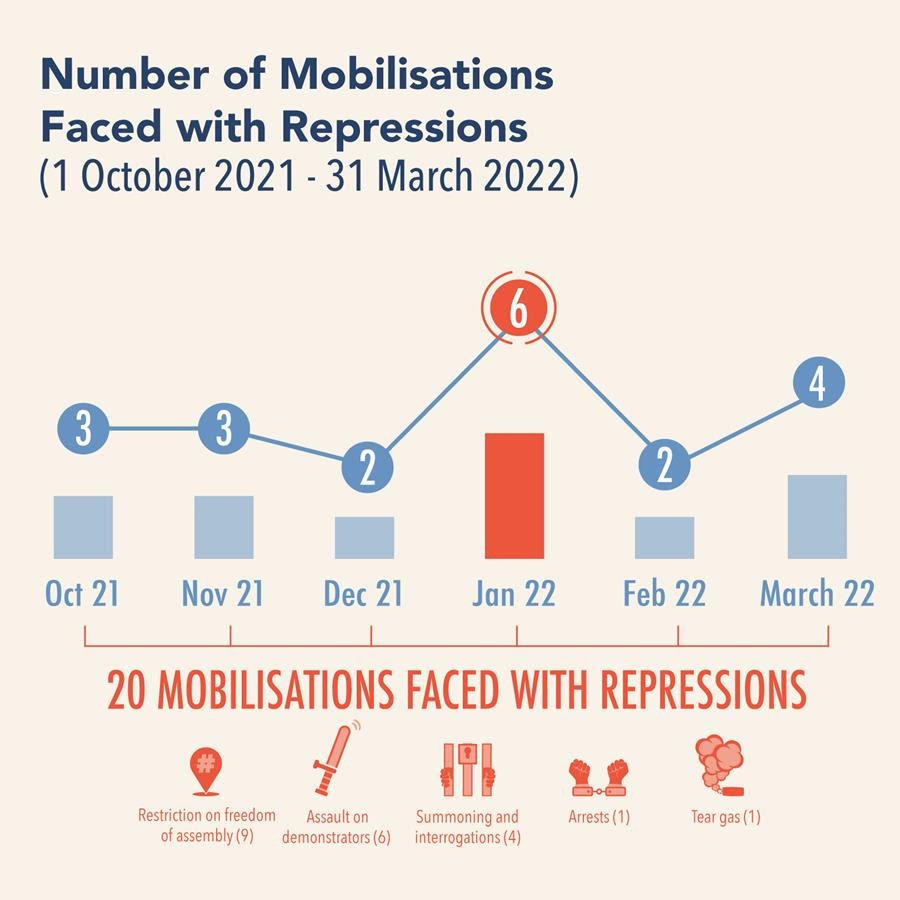
b) FREEDOM OF ASSOCIATION
Creation of 143 new associations - the consecration of a charity approach
143 new associations were published in the Official Gazette from October 1, 2021 to March 31, 2022. 81% of them aim at providing economic support, health services, education and employment opportunities. While these associations attempt to fill a gap, given the absence of a welfare state and of social services and rights in Lebanon, even more so during the current crisis the country is going through, the prevalence of aid and charity organisations is notable and highlights a consecration of the service provision and charity approach, with a limited number of rights associations.
Number of new associations created
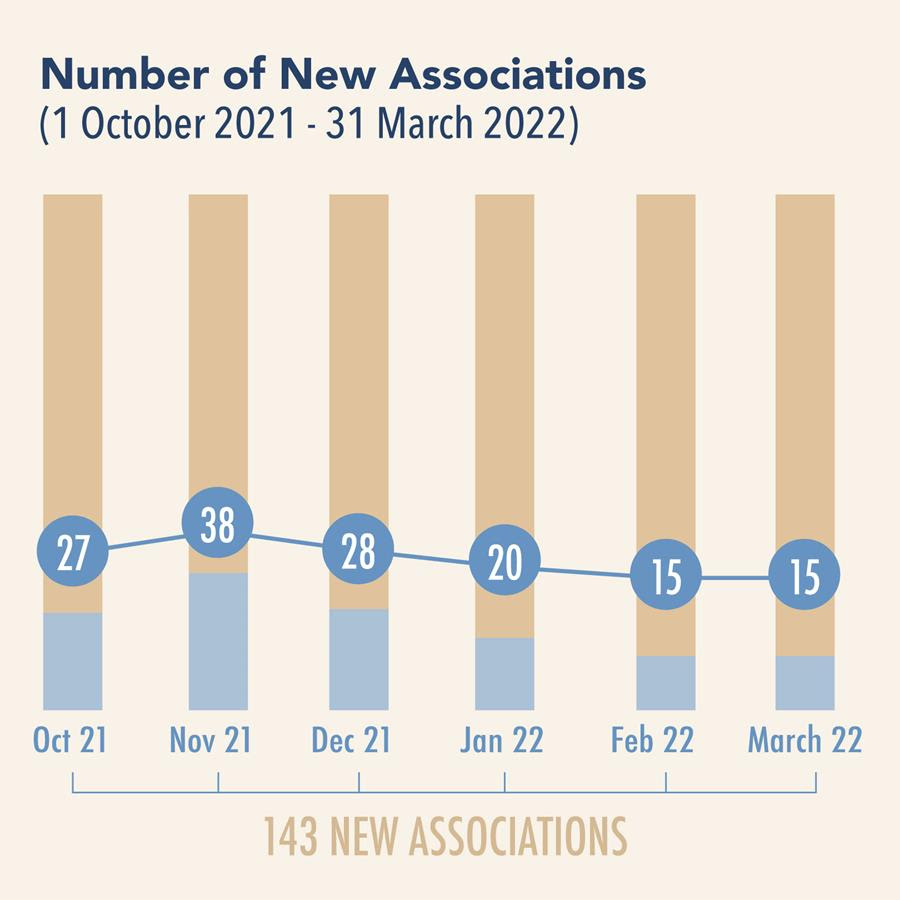
Notable threats on Freedom of Association
• Freedom of Association for Judges
In mid-December, the Administration and Justice Parliamentary Committee adopted a draft law on the independence and transparency of the judiciary. According to this version of the law, judges are allowed to establish associations only if the association’s subject does not enter into conflict with the Supreme Judicial Council’s powers. As a result, judges’ freedom to establish associations is restricted to recreational and cultural clubs, and cannot encompass associations that would tackle judges’ morals, their material rights and their independence.
• Bahraini Opposition Groups
December 2021 and February 2022 witnessed a series of restrictive measures targeting Bahraini opposition groups that criticised human rights records in Bahrain and attempted to organise events in Lebanon. The Interior Ministry issued several decisions ordering the deportation of the members of one of the groups, the cancellation of the events they were willing to host, and eventually the prosecution of the organisers and speakers of the events. This crackdown on freedom of speech and assembly was aimed at not offending Bahraini authorities, as Lebanon was busy trying to ease a diplomatic rift with several Gulf states.
c) FREEDOM OF EXPRESSION
Targeting of journalists
Authorities continuously target journalists. It is worth reminding that Lebanon is ranked 130th out of 180 countries in the 20th Reporters Without Borders annual press freedom ranking.
Between October 2021 and March 2022:
-
General Security arbitrarily detained journalist Nada Homsi for three weeks without clear legal basis. She was suspected of terrorism, spying for Israel, and weapons dealing, but without any judicial charges being brought against her. Only a cannabis consumption charge was brought against her, but was not enough to justify her extended detention.
-
The Military Court sentenced journalist Radwan Mortada to thirteen months’ imprisonment on charges of defaming the Lebanese army and its chief.
-
The Presidency of the Republic filed a claim against journalist Mohamad Nimer following an article he had written on the funding of the electoral campaign of the Free Patriotic Movement.
-
Judge Ghana Aoun filed a complaint against journalist Marcel Ghanem for criticising her recent investigations and prosecutions targeting the banking sector.
Targeting of Human Rights Defenders
Human Rights Defenders were also targeted by authorities. In December, Alshaima Omama Alzubi, a Jordanian activist who advocates for women’s and LGBTQI+ community’s right was arrested. In January, the Internal Security Forces Cybercrime Bureau summoned activist Doumit Azzi Draiby who defended on social media an Ethiopian domestic worker.
Censorship
From October 2021 to March 2022, three publications posted on social media and one artistic production resulted in the arrest, detention and/or summoning of their authors. The latter were censored and targeted for criticising symbols of the establishment, namely the Presidency, the military, and a member of Parliament.
In October, the General Security cancelled the performance of the play Tenfiseh at al-Madina theatre for criticising the presidency and the government, and summoned its director Awad Awad.
In December, General Security questioned Toufic Braidi, a Lebanese social media influencer, also on the grounds that he had insulted the president.
In November, the Military Court summoned Lebanese comedian Shaden Fakih for trial for allegedly humiliating and harming the reputation of the Internal Security Forces.
In January, the Cybercrime Bureau summoned activist Tarek Abou Saleh for interrogation after he criticised on social media Member of Parliament Faisal Karami.
d) CIVIC SPACE PROGRESS
During the last two quarters, protestors mobilised against sexual harrassment. These collective actions led to procedural measures that addressed demands.
In Tripoli, high school students organised three sit-ins on December 6, 7, and 9 to demand an investigation into Samer Mawlawi, a teacher accused of harassment. Following their mobilisation, the Education Ministry suspended Mawlawi on December 7, and he has been in custody pending investigation since April 1.
On February 8, activists demonstrated in front of the Monnot Theatre after the theatre organised workshops for students led by Michel Jabre, who has been accused of sexual harassment in fourty-eight testimonies. On February 12, the management of Monnot Theatre decided to sever ties with Jabre.
2. Visualising Data - Our Latest Infographics on the State of Civic Space in Lebanon
Repression of collective actions in Lebanon in 2021, an increasingly shrinking civic space
Our recent infographic on the Shrinking Civic Space and Repression of Collective Actions that covers the year 2021 reminds us that civic space in Lebanon has been progressively shrinking over the past years, with scrutiny, censorship, and/or repression continuously and increasingly directed towards civil society actors, initiatives, and social movements. This infographic highlights the major trends of mobilisation and the timeline and types of repression of collectives actions in 2021.
Mobilising against repression. Another look at Lebanon's obstructed civic space
The CeSSRA published another infographic that sheds light on an often-overlooked dimension of shrinking space: the mobilisations against the repression of civic space. It covers two additional quarters, from January 2021 to March 2022, a period when 84 collective actions denouncing the arbitrary arrests and summonings of activists, journalists, and artists were mapped. Interestingly, this infographic also highlights the occurrence of almost half of protests in the vicinity of military and security institutions.


